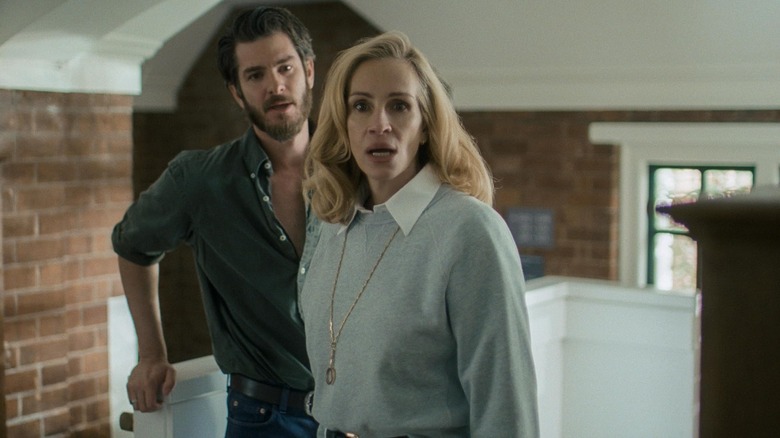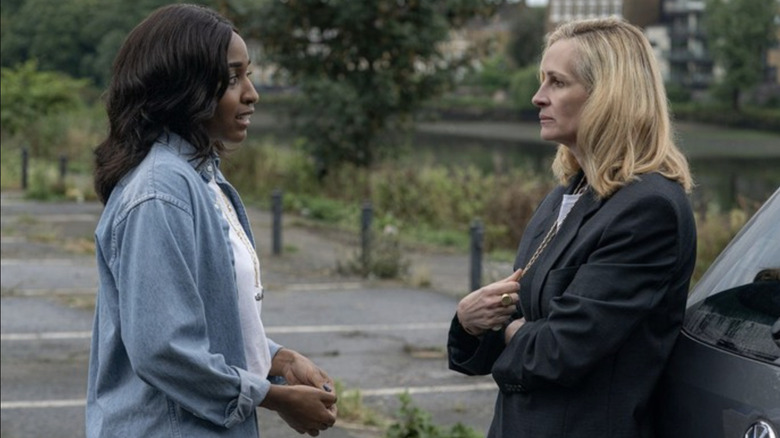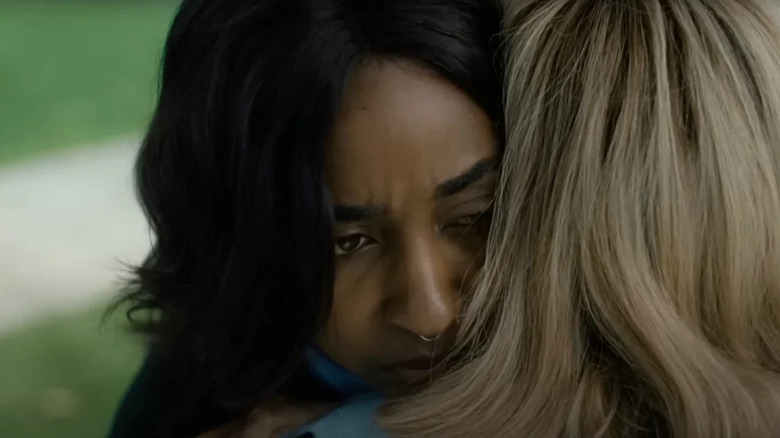After The Hunt Review: Luca Guadagnino's Unpredictable Drama Pushes The Limits Of Ambiguity
The use of ambiguity in art can enhance a story, especially one told within a genre, as it makes the drama feel that much more real, or at least possible. That's because ambiguity in real life is much less compelling. The ambiguous nature of a plot or characters in a film can lead to daydreaming about various theories and interpretations. But ambiguity in real life often leads to frustration, if not anxiety or fear, because the stakes are real.
In his latest film, "After the Hunt," director Luca Guadagnino does something which feels novel, if not groundbreaking. He loads the movie with ambiguity, soaking each and every scene in it. Yet this isn't an experimental or surrealist film along the lines of David Lynch, nor is it a horror movie by Osgood Perkins, where the ambiguity hovers over the proceedings like a magic spell. Instead, the ambiguity of "After the Hunt" feels like a wooden splinter shoved somewhere beneath your skin, where the pain is aching dully throughout but can never be pinpointed or extracted. It makes the movie an experience which isn't immediately satisfying, not even to those of us freaks who adore barbed satire and messy social dramas.
Crucially, however, "After the Hunt" is as compelling as it is uncomfortable, and its accomplished ensemble cast ensured that I never wanted to look away. "After the Hunt" is a movie that pointedly provides no answers to the myriad issues it raises. However, it does feel like Guadagnino puts as much material in front of us as we need to go on our own hunt for meaning and truth. It's this experiential element that keeps the film from being a confused dud.
After the Hunt plays with provocative fire, yet toes the line
On paper, "After the Hunt" sounds like a 1990s social thriller — like "Presumed Innocent" or "Disclosure." Yet Guadagnino's film isn't a genre movie; it never escalates to the point of heightened eroticism or violence. Instead, the filmmaker keeps the movie pitched at an even keel, which is somehow more unsettling than if things went off the deep end. Set at Yale during an indeterminate point within the last 15 years, the film concerns a pair of philosophy professors, Alma Olsson (Julia Roberts) and Hank Gibson (Andrew Garfield), who have been very close friends for years and are both coming up for tenure soon. Each of them have their pet student to mentor; Alma's is Maggie (Ayo Edebiri), a young, queer Black woman. One night, Alma and her psychiatrist husband, Frederik (Michael Stuhlbarg), host Hank and a selection of their favorite students for a party filled with flowing alcohol and spirited debate. After the party, Hank offers to walk Maggie home, which she accepts. The next day, Maggie doesn't show up for any classes, and it's not until late that night when she appears in Alma's building and tells her mentor and friend that Hank sexually assaulted her the night before.
From there, "After the Hunt" appears like it might turn into a he said/she said cancel culture drama, one in which the events of this fateful night will be litigated and debated until the truth comes out. Guadagnino is certainly eager to provoke in this direction; the film's opening and closing credits are done in the exact style of the films of the very canceled Woody Allen. In fact, the film's subject matter not only recall's Allen's personal life but his movies, specifically his dramas like "Crimes and Misdemeanors" and "Match Point." Yet this turns out to be another layer of deception on the filmmakers' part, because Guadagnino isn't using Allen as a creative influence but rather an agitation. Screenwriter Nora Garrett is onboard with Luca's game; in one scene, Chloë Sevigny's university therapist jams out to The Smiths in a college bar while voicing her surprise that they're playing them at all. Is she happy the youths are listening to a band she grew up with, or is she pleasantly surprised that they're cool with playing a song from the canceled Morrissey? To these and numerous other provocative issues raised during the film, Garrett and Guadagnino provide no direct commentary, toeing the line in a way which could be too lazy, cowardly, or unfulfilling to some.
The cast of After the Hunt steals the show, but Guadagnino's visual language is its secret weapon
"After the Hunt" is a tricky film that doesn't allow things to be drawn with broad strokes. Fortunately, the ensemble cast is more than up to the task. Each of them weave an enigmatic web: Stuhlbarg's husband could be a thankless role in lesser hands, but the actor gives him an air of mystery that implies a great deal about Frederik and Alma's marriage. Garfield refuses to allow Hank to become cliche (as the character fears aloud), giving the man some surprising shape and depth. The standout performances belong to Edebiri and Roberts, however. Edebiri is quietly transformative in her role, twisting her natural comic instincts into something idiosyncratic and cryptic. Another of the film's provocations is how Maggie is the source and center of much of its drama, yet she's the person we come to know the least. Some of the revelations about her character would be a smoking gun in another movie, and another actor would capitalize on this. Instead, Edebiri is an ouroboros of intention, neither victim nor manipulator but someone unsettlingly in between.
Roberts is nothing short of revelatory. Her performance as Alma is so natural and assured that it feels like the sort of character she's been playing her whole career. It's certainly intentional on Guadagnino's part to weaponize Roberts' sweetheart screen persona against her (and us), but again, this isn't a film about skewed perception. Rather, it's a movie about how unreliable perception itself is, especially people keep moving the goalposts and bending the rules of morals and ethics without anything as considerate as an announcement. Guadagnino is not the type of auteur who uses the same stylistic tics in every one of his films, which is why "After the Hunt" feels 180 degrees from the kinetic satire of "Challengers." Instead, the director and cinematographer Malik Hassan Sayeed tease and provoke the audience by blending more traditional compositions (in this very dialogue-heavy film) with intermittent POV insert shots. They're using the grammar of cinema against us — are we seeing Alma's hands or Hank's eyes while they're speaking because they're telling us a secret? Or might Guadagnino and Sayeed be using this grammar to help us, which means the film can indeed be decoded in a fashion parallel to Guadagnino's "Suspiria" and "Queer?" To best appreciate "After the Hunt" is to accept the title's indication of a post-incident period, a questioning "what now?" moment after the dust settles. In the movie, as in life, there are no easy answers, and while that means the film isn't fully satisfying, it's also a mystery I can't easily let go of.
/Film Rating: 6.5 out of 10
"After the Hunt" opens in theaters on October 10, 2025.


